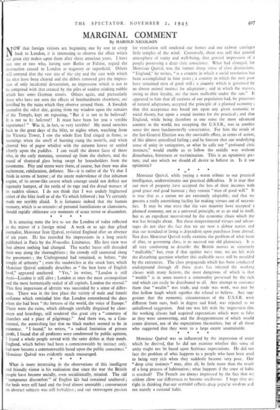What is more interesting in the observations of this intelligent
and friendly visitor is his realisation that since the war the British people have become socially, even socialistically, minded. The old sumptuous discomfort " of English life had remained unaltered ; the beds were still hard and the food almost uneatable ; conversation on abstract subjects was still forbidden ; and our extravagant passion for ventilation still rendered our homes and our railway carriages little temples of the wind. Conversely, there was still that general atmosphere of sanity and well-being, that general impression of a people possessing a deep civic conscience. What had changed, for Monsieur Queval, was the former sharp sense of class distinctions. " England," he writes, " is a country in which a social revolution has been accomplished in four years ; a country in which the new poor have remained men of good will ; a country which is governed by an almost animal instinct for adaptation ; and in which the masses, owing to their loyalty, are the most malleable under the sun." It appeared to him that all sections of our population had, by processes of natural adaptation, accepted the principle of a planned economy ; that this acceptance was based not upon any given economic or social theory, but upon a sound instinct for the practical ; and that England, while being therefore in one sense the most advanced country in the world, not excepting the U.S.S.R., was in another sense the most fundamentally conservative. For him the result of the last General Election was the inevitable effect, in terms of action, of this almost unrealised feeling ; and he foresaw that our underlying sense of unity in variegation, or what he calls our " profound civic instincts," would enable us to follow the middle way without disturbance, bitterness or recrimination. This is an optimistic pic- ture, and one which we should all desire to believe in. Is it too optimistic? * * * *






























 Previous page
Previous page